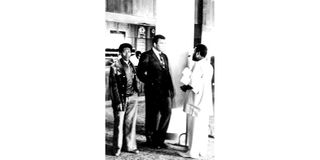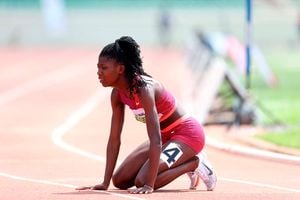
Waigwa Kiboi, when he met Muhammad Ali at InterContinental Hotel, Nairobi, on February 1980.
Few boxing bouts have captured the world's attention as "Rumble in the Jungle" -- an epic clash held in Kinshasa, Zaire (now the Democratic Republic of the Congo), pitting the then fearsome reigning world heavyweight boxing champion George Foreman and the charismatic former champion in the division Muhammad Ali, simply known as “The Greatest”.
The venue, 20th of May Stadium, was filled to capacity with over 60,000 fans in attendance amidst the sweltering heat and commotion. The fight was beamed to all corners of the world and watched by an estimated one billion people.
This week, Kenyans join the rest of the world in celebrating the 50th Anniversary of that epic fight that took place at dawn on October 30, 1974.
This battle was significant in a number of ways. First, it involved two black American heavyweight boxers known for their ring experience in different styles, agreeing to fight in Africa -- the land of their ancestors.
Secondly, it proved to the whole world that the so-called Dark Continent had the capacity and capability to organise an event of this magnitude. Thanks to President Mobutu Sesseko of Zaire who fitted well with the adage that, you don't judge a book by its cover.
Mobutu was the power behind the success of this memorable battle. He pulled resources through his government to ensure Zaire was put on the world map positively. The success proved to the world that Africa could do even better.
Kenya was among the countries honoured with invitations by the organisers of the big fight. Kenya had already established itself as a power in boxing not only in Africa but also on the international arenas, including the Commonwealth Games.
Among Kenyans who travelled to Kinshasa to watch the fight were Steve Muchoki, one of the country's most decorated boxers who fought at flyweight. Others were Isaac Maina (bantamweight) and Peter Dula at middleweight.
The three had represented Kenya in the inaugural World Boxing Championships in Havana, Cuba. They were accompanied by Cornelius Monteiro as team manager and Major (Dr.) Momanyi. Maina and Dula are deceased.
Says Muchoki: "It was a great honour to watch the fight from the ringside where we were treated as special guests. Ali was a ring genius and I rooted for him to win.
His footwork was awesome. He could move around the ring displaying at times the famous Ali shuffle as he waited for Foreman to enter the ring. Finally, the champion entered the ring showing his menacing looks. Ali was not bothered."
For those who follow the world of boxing keenly, there was something in Ali that baffled many - his ability to neutralize the punching power of the most feared boxers and as the situation demanded, knock them out.
Ten years before the Rumble in the Jungle, Ali, then aged 22 and known as Cassius Clay, destroyed Sonny Liston who was a world champion and perhaps the most feared ring monster, whose fist at 15.5 inches in circumference, remains the biggest in professional boxing history.
Liston and Foreman were close friends who had trained together and saw Ali as a common enemy. Eventually, Ali knocked out Foreman in the eighth round to prove to the world who truly was the greatest.
Muchoki has a lot of praise for the organisers of that epic battle who included Shimpupu wa Shimpupu, a Zairean official who ensured everything went smoothly.
Muchoki and his colleagues shared the same hotel with Ali and his entourage but on different floors.
He left Kinshasa for Nairobi happy and energized knowing there was more in Africa to attract foreign investors to create conducive environment for sports and other development activities.
This writer was not lucky to watch the fight live as he lived in rural Nyeri where few people owned television sets let alone radios. Nevertheless he relied on newspapers for updates and was able to predict the outcome of the fight correctly.
However, some consolation came six years later when Ali visited Kenya in February 1980 and later in Sudan in 1984, meeting the writer and others and sharing ideas touching on human development through sports.
Larry Ngala, a veteran golf writer for Nation Media Group, attended the Rumble in the Jungle on assignment with Voice of America radio.
He says his main duty was to cover the music concert put together by the late jazz maestro Hugh Masekela and record producer Stewart Levine.
Says Ngala: "This was meant to be a major promotional event for the heavyweight boxing championship. It was postponed for six weeks after Foreman sustained a cut during training. The music festival intended to bring international tourists was pushed to the day of the boxing counter."
The music festival brought together over 31 performing groups like B.B.King, Bill Withers, James Brown -- all from the USA.
From Africa, Larry remembers music bands led by T.P. OK Jazz, Zaiko Langa Langa and Tabu Ley Rochereau and the seductive voice of Miriam Makeba.
Says Larry: " It is quite interesting to remember those memorable events 50 years down the line as if they happened yesterday. I was just one and a half months old at Nation".
Ngala says the fight was the greatest he ever watched.
Sammy Ng'ang'a, a veteran sports researcher particularly boxing, says Rumble in the Jungle was the greatest sporting event in Africa in the seventies all through to the eighties.
Says Ng'ang'a: "I recall the Ali- Foreman fight like it was yesterday, the hype in the dailies. There was palpable disappointment when the fight was postponed after Foreman was badly injured by a sparring partner.
“The media went wild after malicious rumors spread that both fighters were disillusioned with Zaire and wanted the fight moved to the US.
“Luckily for all, Dick Sadler, Foreman's trainer at the time was able to treat the injury with what was referred to as "Sadler butterfly special", a cross bandage covering the deep cut.
In Kenya, fans were able to watch the fight on direct video link at the KICC at the very ungodly hours of 4am."
Besides the championship fight, there were other documented incidents then as reported by Ngala.
Larry Holmes was Ali's sparring partner, Ali's future third wife, Veronica Porche was one of the poster girls promoting the fight, less than an hour after the fight ended, a huge tropical downpour wrecked the very stage the fight was held.
Singer Jonny Wkelin produced a bestselling song, In Zaire, after the fight. Spike Lee produced an award winning documentary When We Were Kings about the fight.
The bout also gave promoter Don King a firm grip in the heavyweight division which he held on to for many years, says Ng'ang'a.
If nothing else, that fight spawned more interest in the blood sport with many youngsters dreaming of one day punching their way to the top.










